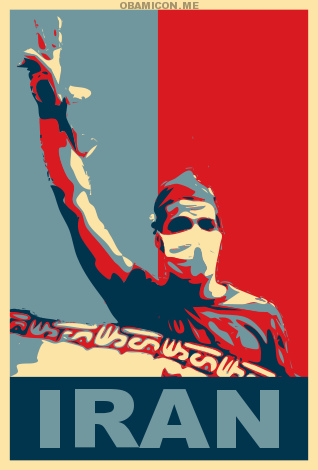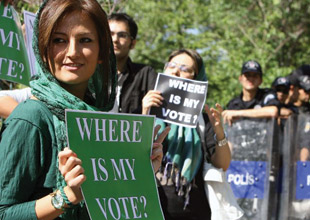There’s a rally scheduled in Iran today. It should happen around 7:30 EST. I’ve been up all night thinking about it. The news from that country over the past week has shaken me. As the week wore on and the rallies continued, I feared the hardliners might lose their patience. Yesterday, they seemed to indicate they have. Ayatollah Khamenei’s speech at Friday prayers hinted at violence and left little room for compromise. Iranians know what may happen today if they once again march silently by the millions through the streets of their capital: They might not come back. It seems they will go anyway. As you can tell from the (immensely moving) video above (h/t Andrew Sullivan, who deserves an award for his coverage of the past week), the shouts of “God is great” and “death to the dictator” were louder than ever in the city last night. The opposition leaders do not seem to be backing down, despite government promises to arrest any of them who appear at the rally. Defeated presidential candidates Mir-Hossein Mousavi and Mehdi Karoubi and former president Mohammed Khatami have promised to be there, according to the BBC. (Update 7:00 a.m.: The situation is increasingly ambiguous, and the BBC says they’re getting “mixed messages,” but their Tehran correspondent says the rally will probably still go ahead. Twitter messages seem to confirm it’s still on.)
There’s a feeling I’ve had in the pit of my stomach ever since the rallies started in Tehran. I recognize it from every time I have really wanted something to happen despite how unlikely it seemed at the time. It’s not optimism, because I know the protesters face overwhelming odds and I know that Ahmadinejad and Khamenei and the hardliners won’t go easily. It’s hope. Hope is rooting for something you know to be unlikely or impossible, like universal health care or a black man being elected President. Hope is what we hold on to in the face of tough realities. That’s why the stories, fictional and not, that move us most deeply are the ones in which the heroes face down enormous odds. Every culture—every family, even—has its own David and Goliath story. In my family, that story is about my grandparents.
My maternal grandmother, whose mother was Christian, converted to Judaism in Berlin in 1937. She was in love with my grandfather, who was Jewish. When he was deported to the Warsaw ghetto, she could have left Germany with the Peruvian visa she had somehow obtained. Instead, she followed him. They escaped from Warsaw before the liquidation of the ghetto and were married in hiding. On Easter Sunday, 1944, they boarded a train to Berlin, carrying false papers. My grandfather figured that Berlin would be the last place the Nazis would be looking for Jews in 1944, and that Easter would be a good day on which to travel. He was right, and here I am today.
What does any of that have to do with Iran? Just that, in the face of overwhelming odds, people don’t always do the rational, self-preserving thing. They go to Warsaw instead of Peru. They risk their lives in the streets instead of going to work. Sometimes things work out, and the underdogs win. My existence is proof of that. But a lot of the time people aren’t as lucky as my grandparents. David doesn’t always win. The tanks roll into Tienanmen. The neighbors turn in Anne Frank. And seemingly mundane decisions separate the times that the underdogs win from the times that they don’t.
This relates to the banality of evil that Hannah Arendt wrote about. Evil doesn’t always manifest itself in grand conspiracies or random murders. That’s too easy. More often, it’s just someone doing his or her job. A soldier following orders. A Basij beating up some people in the street. A bureaucrat making sure the trains run on time. When the underdogs win, it’s usually because people don’t act the way they’re expected to. What’s happens today in Iran rides on that interaction between people just doing their jobs—cogs in the machine—and people who, because of their frustration and disappointment, are fighting against that machine. A German soldier helped my grandparents escape. Who will help the protesters today? Will the Revolutionary Guards and the Basij slaughter their own people? Or will some—or all—join with the protesters? What would you do?
I know that even if, by some miracle, the soldiers lay down their arms and the protesters win today’s confrontation, the Middle East’s problems won’t be magically fixed. Mousavi isn’t some pro-American friend of Israel—far from it. But it’s hard to root against the people marching silently though the streets, demanding a vote and a voice. As Peggy Noonan wrote yesterday, “the uprising, as it moves us, reminds us of who we are: lovers of political freedom who are always and irresistibly on the side of the student standing in front of the tank or the demonstrator chanting ‘Where is my vote?’ in the face of the billy club.”
That’s why, as much as I understand how counterproductive it would be for President Obama to speak directly in support of the protesters (because it would help Ahmadinejad/Khamenei to paint them as American stooges), I sometimes harbor the secret, selfish wish he would. We keep hearing that this isn’t about us—it’s about them. That’s right, of course, but it’s more complicated than that. We identify with the protesters. I know it’s overly emotional and solipsistic to get so involved in the political goings-on in Iran while sitting comfortably in America. But I can’t help it, and neither, I suspect, can many people around the world. Their calls for justice and freedom have universal resonance. On Friday, President Obama, constrained as he is by political realities and his own temperament, warned the Iranian government about what might or might not happen today:
I am very concerned… that the government of Iran recognize the world is watching, and how they approach and deal with people who are, through peaceful means, trying to be heard will, I think, send a pretty clear signal to the international community about what Iran is – and is not.
I understand Obama’s rightly-praised reluctance to hand Ahmadinejad ammunition for his political battle. But if Khamenei cracks down, and the world witnesses another Tiananmen, I doubt that Americans will embrace engagement with the regime. We see too much of ourselves in the protesters. We hope for them. We are watching. If they are murdered, and they very well could be, what will Obama say then?












